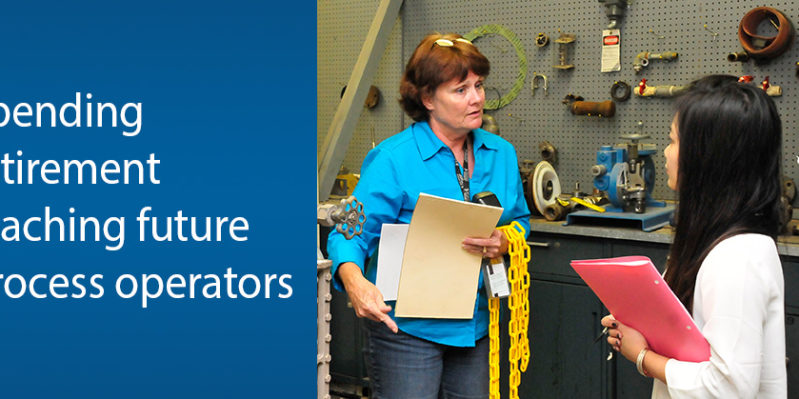
 Stewart began her career as one of three women at her plant
Stewart began her career as one of three women at her plant

Cheryl Stewart, San Jacinto College process technology instructor, teaches introduction to process technology, occupational safety and health courses, and classes on hand tools and operations. She has years of experience and began her career as one of only three women working at a plant in 1983.
Photo credit: Jeannie Peng-Armao, San Jacinto College marketing, public relations, and government affairs department.
One glance at the process technology field will reveal that there are slightly more men working as operators than women, but that is changing.
Cheryl Stewart, San Jacinto College process technology instructor, teaches introduction to process technology, occupational safety and health courses, and classes on hand tools and operations. She’s more than qualified, having worked for the likes of Amoco, BP, and GBB. She’s witnessed many changes in the petrochemical industry – going from one of only three women in a large plant to now head of not one but a variety of courses teaching the next generation of process operators.
Loan Nguyen is her student. At first, the 23-year-old said she was nervous about the thought of being a woman entering a field occupied predominately by men, but that’s all changed now after training with Stewart.
“Since I’ve being training, I know women can do this job,” said Nguyen. “I’m working as a nail technician in Texas City, and I have a lot of clients who tell me about the good pay and their work at the plants. This is what made me decide to do this. I enjoy the training, the process of what happens in the plants. I look forward to talking with employers soon.”
Stewart notes that the field has changed drastically over the years for women and with the education requirements and training of operators.
What was it like being a woman working in process technology?
“It was very daunting when I came into the field in 1983. I was one of three women at the plant, and most of the time, women worked inside the labs. But that’s changed. It’s a wonderful career for everyone. It’s a career you want to work in for a long time. If you learn as much as you can, you’re going to be a great asset at
the plant.”
Are STEM skills involved in process tech?
“Science is definitely involved. What are the fluids doing in our pipes? What are the pumps doing to give the fluid energy? It involves Bernoulli’s principle. That’s all science. The technology involves our control boards, our automated control valves. Then of course there is math with the material balance and translating the flow into a different measurement.”
What’s the benefit of earning an associate degree in process technology?

Loan Nguyen, process technology student at San Jacinto College, is training to be a part of the next generation of process operators.
Photo credit: Jeannie Peng-Armao, San Jacinto College marketing, public relations, and government affairs department.
“You have so many opportunities with just this one degree. You are more well rounded and gain more of the hands-on experience that you need to succeed and have the potential to move up in your career.”
How are the job opportunities in process technology?
“Industry is asking for people who are willing to go out there and work hard. Times are definitely changing. This is a good time for people to go into this career because people like me, the baby boomers, are retiring. I retired in February. My buddies, my former coworkers, are retiring as well. They’ve already made the money they need to live of off for the rest of their lives.
So, the rumors are true. We’re retiring, and the industry needs new people to do the work.”
– Jeannie Peng-Armao
